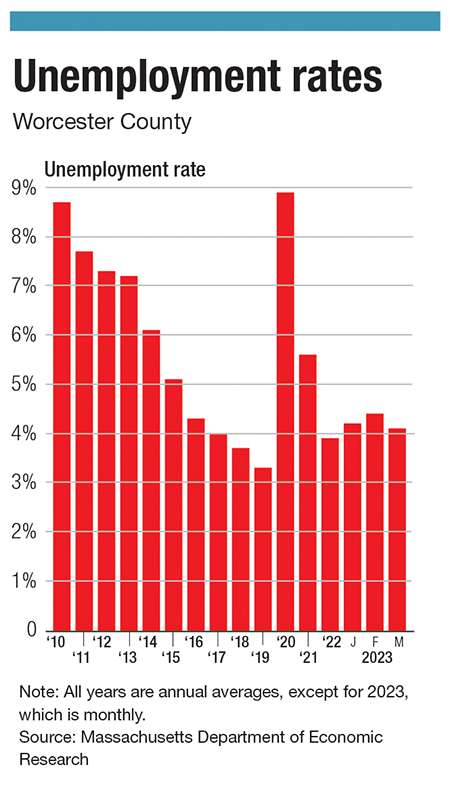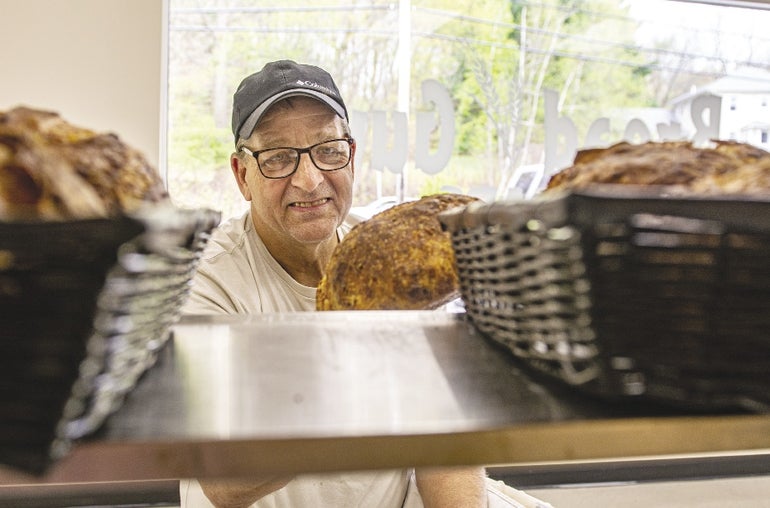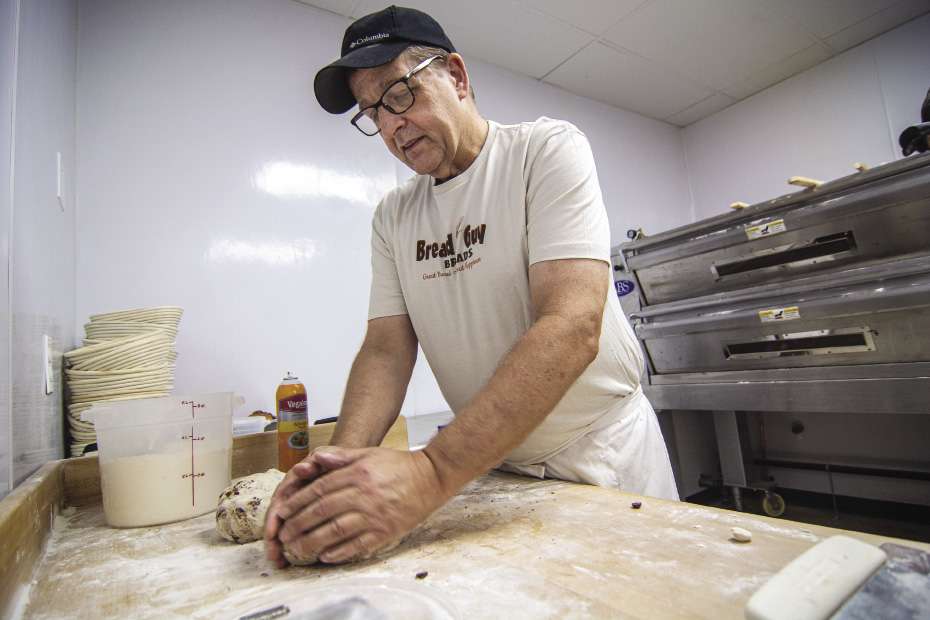
Getting out of the kitchen: A Grafton baker found an unusual partner in growing his home business
 Photos | EDD COTE
Chuck Brown keeps Bread Guy Breads open 9 a.m. to 6 p.m. Tuesday through Friday and from 7 a.m. to noon on Saturdays.
Photos | EDD COTE
Chuck Brown keeps Bread Guy Breads open 9 a.m. to 6 p.m. Tuesday through Friday and from 7 a.m. to noon on Saturdays.
Chuck Brown’s day starts before sunrise.
By 3 a.m., he’s at the bakery to get that morning’s bread ready for when the storefront of his Grafton shop opens at 7 a.m. On weekends, when it’s cinnamon roll day, the morning starts earlier. One Saturday, he arrived at 12:30 a.m. and sold out the 16 dozen rolls he made before 8 a.m. He needed to make more the next week.
Having to bake more seems to be the norm for Brown.
What started out as a hobby has morphed into Bread Guy Breads during the coronavirus pandemic. The former school principal for 15 years at schools in Vermont and Millbury, as well as the head of school at Seven Hills Charter Public School in Worcester, baked bread for years as a pastime. The sourdough starter he uses at the bakery dates back years. But it was always for pleasure and not a job. During the pandemic, though, Brown decided to step back from his career in education. He needed something new. So, he began to bake more bread.
When a friend lamented the area had no good bread, Brown told him he could bake something he’d like. That’s what he did. Word got out. More people put in orders. His home oven became a lifesource. A new business. What was once a passion project became something else. It grew to the point where he was featured on WCVB Channel 5’s “Chronicle” news magazine program.
“I had a little more time, and I gave bread to some friends,” Brown said. “Then somebody posted on Facebook, ‘Oh, he makes bread.’ And then all of a sudden it was madness. And then the health department called me and said, ‘You have to be legal.’”
Brown needed to apply for the proper permits to operate a bakery out of his house. He needed to become a retail residential kitchen, which is anyone producing food for sale. That meant Brown needed to be inspected and permitted by the local board of health in Grafton. Brown filed as a sole proprietor, and by late 2020 he was on his way.
Brown’s home filled with proofing dough, baking pans, flour, and other materials. He started accumulating Dutch ovens, which he used to bake in his home oven because they’re different from commercial ovens and the cast iron pots allow the bread to reach the right temperature and retain the proper amount of moisture in a conventional oven. He launched a website for ordering. A hobby became a career.
But it had all got to be too much. His home was no longer his home. He needed a plan. He reached out to the Massachusetts Small Business Development Center Network at Clark University in Worcester and started developing a business proposal. He started looking at a way to make this baking thing into his next act.
“I was making about 400 loaves a week at my house,” Brown said.

The right partner
Starting a business is hard enough, as historically about one-fifth of new companies fail within the first year and about half make it beyond the fifth year, according to U.S. Bureau of Labor Statistics data.
Creating a successful and sustainable new business requires an idea and execution, some luck, and good timing. Being in a suburb with everyone locked up because of COVID was the right time for Brown to start a bakery. It afforded him time to learn because he had no other preoccupation and because other people agreed to go along for the discovery. Baking, specifically bread, is an exploration. There are recipes, a litany of them. There are cookbooks and YouTube videos, but every loaf is different. Every batch of flour holds something new. Every starter and levain is not equal. Each time you turn your dough or crank your oven, something changes. The process evolves. As Brown’s bread grew in demand, his life changed, and he needed a change.
He needed some help.
Brown was stuck between turning his home into a full-time business or taking out loans to push the project to the next step to open a business in a commercial space. He started working with Robert Del Mastro, senior business advisor for MSBDC in Worcester. He changed from a sole proprietor to an corporation and began exploring how to get the business out of his house.
“Most people want to make the transition out of their house,” Del Mastro said. “Many don’t make the transition because you go from low cost to now taking on rent and a space, and in Worcester rent is outrageously high, especially in a busy area.”
Del Mastro has worked with clients as they try to make this big jump and not only is rent tough, but so is the build out. Building a bakery means getting in restaurant-grade equipment and meeting specific electrical and ventilation codes on top of health codes. All of those costs come up front.
“Some people who make the leap rely on investment because it is five, six, seven years before you pay yourself or break even,” Del Mastro said.
Eventually, Brown’s connections in education led to him meeting with the Grafton Public Schools and connecting with its Grafton Achieving Independence Now (GAIN) program, which gives job training and life skills to students with disabilities who graduate from high school but can continue their public education until they turn 23. At the same time as Brown wanted to expand beyond his home kitchen, Grafton was thinking of how to make its 18-22 program, which was called School to Work, more attractive to students and their families.
“We were finding as a school district that we weren't reaching all the students we could reach because it was still located within Grafton High School,” said Nicole MacDonald, special education administrator at the Grafton Public Schools.
At the end of the previous school year, the school district decided the program needed to move out of the school and into a new, separate location with a more adult-living feel to appeal to more students. In its research, the school system found the best programs were attached to businesses, but the school district didn’t want to own and operate a business itself.
“We wanted to focus on the students, their disabilities, and their needs and less running a business,” MacDonald said. “We felt like partnering with somebody that had a small business that really wanted to work with us and really wanted to work and promote the independence for students with disabilities would be a better option.”
Along came Brown.
“Chuck previously worked in a school district as a principal and worked with students with special education needs, so we really felt like if Chuck was wanting to do this, this would be a great option for him,” MacDonald said.

A win-win deal
Brown agreed to sublease the bakery section of the space while the school built out a rec room for the students. At the same time, the students would be employed at the bakery and learn skills in and around the small business. The plan to open the bakery and storefront at 204 Worcester St. in Grafton took off, officially opening in March.
The program and Brown partnered up to give each other the necessary next step the pair needed for their evolutions. Brown leases the space while the school program gets an invested entrepreneur to help guide and train its young adults into the next phase of their lives. A win-win.
These deals don’t come along often, but they’re something Del Mastro suggests. If a small business owner can partner with another business, it helps keep costs down and get an imprint in the community. Still, though, sweat equity has to go into a new business, he said.
Brown’s sweat equity means still more long hours as he hones his breadmaking and finds the right groove with planning out bake times and releases. It means working with the GAIN program and setting the students up for success, helping them find the next steps in their lives. Seven students work at Bread Guy Breads, but soon, the number of students will grow, MacDonald said.
First, though, Brown needs to make the bread, which takes time.
“My philosophy on this is just take it slow and build it,” Brown said. “That's what I did at home. I went from 10 to 400 loaves a week.”









0 Comments